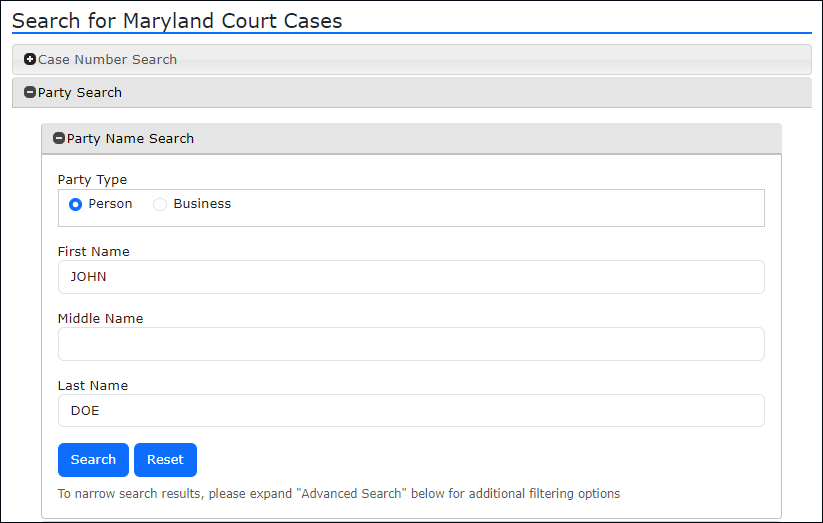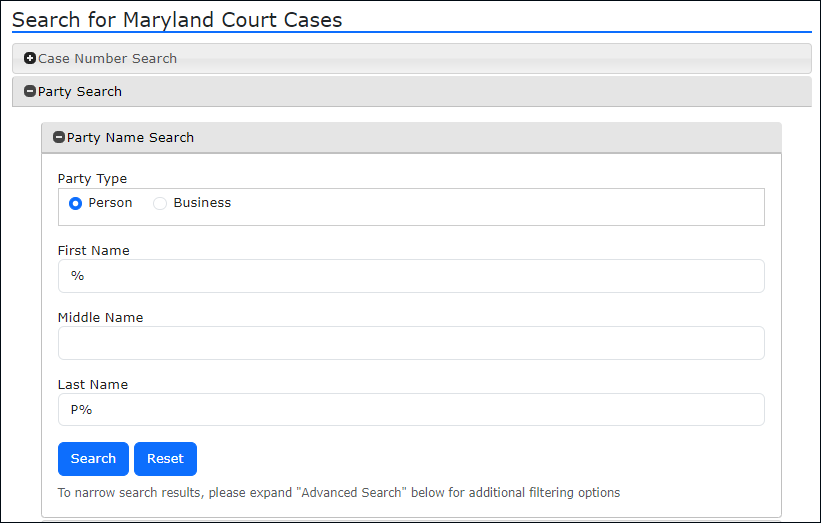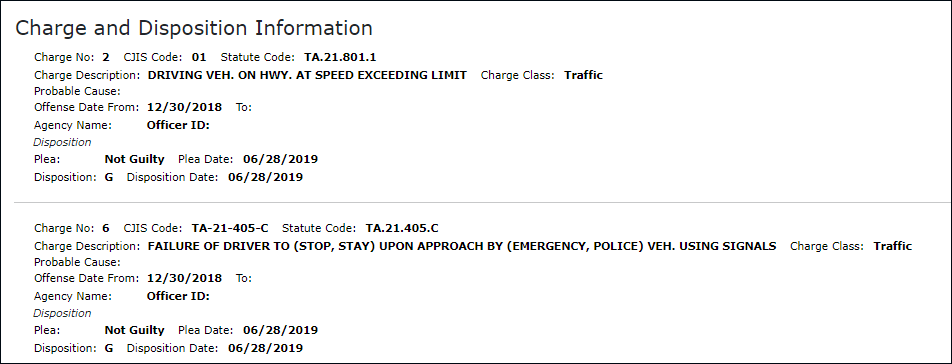CAPTCHA Notice
The Maryland Judiciary strives to protect the integrity of the information regarding cases and respective parties stored in its applications and systems. To further that cause, the Maryland Judiciary has implemented CAPTCHA technology to confirm users are not robots or other automated systems in order to access and use CaseSearch.
CAPTCHA, Completely Automated Public Turing test to tell Computers and Humans Apart, is a process used by businesses and governments for information security purposes.
If needed, Maryland non-profit legal service providers utilizing CaseSearch in an effort to support Maryland litigants can request alternative non-CAPTCHA solutions by emailing [email protected].
Name Search Notice
Case Search name searches default to search for exact names only. For partial name searches, input at least the first character of the last name, followed by a % symbol. The first name is not required.
The system will perform a search for the exact names entered in the first and last name search fields.

For partial name searches, input at least the first character of the last name, followed by a % symbol. The first name is not required. For partial first name searches, optionally enter any characters followed by the %. Please note the % cannot be inserted at the beginning or middle of words.

Notice: Pursuant to House Bill 837 (2022), Maryland Case Search may not in any way refer to the existence of a criminal case in which possession of cannabis under § 5-601 of the Criminal Law Article is the only charge in the case and the charge was disposed of before July 1, 2023.
Notice: Effective December 14, 2022, the names of Maryland’s two appellate courts were changed. The Court of Appeals of Maryland was renamed the Supreme Court of Maryland. The Court of Special Appeals was renamed the Appellate Court of Maryland. Supreme Court of Maryland cases initiated on or after December 14, 2022, have a leading case number abbreviation of SCM (previously COA). Appellate Court of Maryland cases initiated on or after December 14, 2022, have a leading case number abbreviation of ACM (previously CSA).
Notice: Pursuant to House Bill 1336 of the 2020 session, expungements are expanded to include 4th degree burglary offenses. Additionally, criminal/traffic charges where the disposition is acquitted, dismissed, nolle prosequi, or not guilty will be automatically suppressed from Maryland Case Search. If all charges on a case qualify, the entire case will be suppressed. If a case contains non-qualifying charges, those charges will be displayed. Missing charge numbers are deliberate and reflect the charge removal(s) of some of the charges on a case.

Notice: As a result of House Bill 83 and Senate Bill 314: 2020 Regular Session, certain criminal cases will be protected from public view beginning March 15, 2021. HB 83 prohibits the display of any District Court criminal case where marijuana is the only charge and the charge was disposed before October 1, 2014. SB 314 specifies that a case where a juvenile is charged as an adult will remain confidential until the court determines whether the case will be transferred to juvenile court.
Notice: Unit Charge Removals
Maryland Code, Criminal Procedure, Article, §10-107 defines two or more criminal or incarcerable traffic charges arising from the same incident, transaction, or set of facts as a “unit.” Any charges for minor traffic violations that arise from the same incident, transaction, or set of facts are not part of the “unit.”
If a defendant’s case consists of unit charges and non-unit charges, and each unit charge is eligible for expungement, the court could order that one or all of the unit charges be expunged. If so ordered, the court must remove all relevant court records from public inspection, thereby charges may appear to be missing from the sequential list of charges assessed to a case (e.g., after removal of the unit charges, the charges may display as 1, 4, and 5). Charges missing from cases are deliberate and reflect the court’s unit charge removal.
References:
Statute CP §10-107 and Court of Special Appeals Case No. 2182, September Term, 2018
